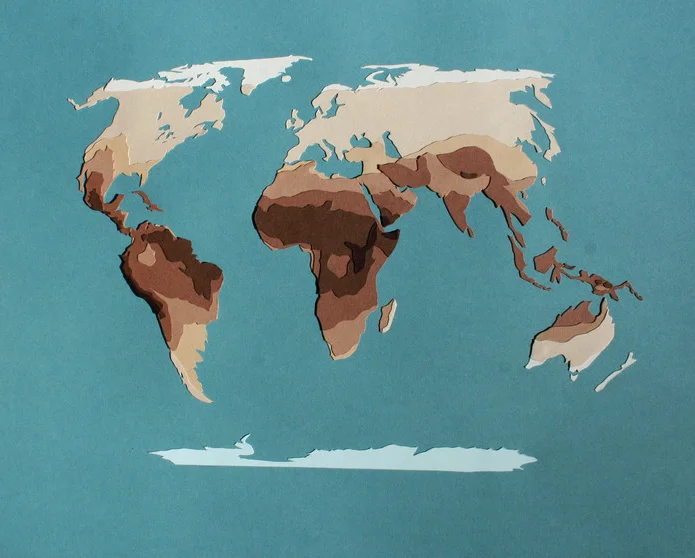Skin colour should be no more socially relevant than webbed feet or earwax production
Over a third of people who are not white have experienced racial assault and 77% of black people have been racially abused in the UK.
Every single human descends from ancestors with black coloured skin. Skin colour is just one of countless genetic divergences that have occurred geographically among separated populations over time. It is no more socially relevant than other genetic variances that could have been used to divide populations, such as whether you have webbed feet or wet or dry ear wax.

The quantity of Melanin within skin, directly determines the colour of skin, that is all. When all of our ancestors lived near the equatorial sun in Africa, the strong sunlight caused them to develop high levels of Folate, an essential B vitamin in the blood, which subsequently caused humans to evolve to produce Melanin, a dark brown pigment of the skin that acts as a natural sunscreen as a way of safeguarding the body’s folate stores and skin against the sun.
In countries closer to the equator, the supply of vitamin D is adequate as there is enough UV light to penetrate darker skin. However, as our ancestors migrated further from the equatorial sun, there was not enough sufficient vitamin D to breach the skin, combated against by the high levels of melanin protecting the skin, especially during the winter months in which health was majorly compromised. The sun is vital in the body’s ability to produce vitamin D, essential for the immune system and in fighting cancers and heart disease. As such darker skin became a disadvantage, and the evolutionary response was to lose pigmentation so individuals with less melanin could receive the benefits of the sun, as UV light depletes the levels of folate to penetrate the skin.
There is more UV to block in the equator as there is an excess of sun for what the body needs, people living their didn’t need to receive all the vitamin D on offer due to the constant sun, so melanin was retained to fight the unwanted rays, with no need to evolve to lighter toned skin. White skin is only 8000 years old.
Prior to the early modern period in Europe and since the beginning of history, skin colour always meant difference but not systematically differential treatment, it took a few elderly moustached white colonials for skin colour to start taking on a significantly different meaning for the rest of time.
.png)
Luca Rufo
‘Skin colour should be no more socially relevant than webbed feet or earwax production’
Over a third of people who are not white have experienced racial assault and 77 percent of black people have been racially abused in the UK.
So, acting as a helpful reminder, it’s vital for universal acknowledgment, that every single human descends from ancestors with black coloured skin. Racial intolerants not only commit atrocities but are constantly disrespecting their black family.
Skin colour is just one of countless genetic divergences that have occurred geographically among separated populations over time. It is no more socially relevant than other genetic variances that could have been used to divide populations, such as whether you have webbed feet or wet or dry ear wax.
The quantity of Melanin within skin, directly determines the colour of skin, that is all. When all of our ancestors lived near the equatorial sun in Africa, the strong sunlight caused them to develop high levels of Folate, an essential B vitamin in the blood, which subsequently caused humans to evolve to produce Melanin, a dark brown pigment of the skin that acts as a natural sunscreen as a way of safeguarding the body’s folate stores and skin against the sun.
In countries closer to the equator, the supply of vitamin D is adequate as there is enough UV light to penetrate darker skin. However, as our ancestors migrated further from the equatorial sun, there was not enough sufficient vitamin D to breach the skin, combated against by the high levels of melanin protecting the skin, especially during the winter months in which health was majorly compromised. The sun is vital in the body’s ability to produce vitamin D, essential for the immune system and in fighting cancers and heart disease. As such darker skin became a disadvantage, and the evolutionary response was to lose pigmentation so individuals with less melanin could receive the benefits of the sun, as UV light depletes the levels of folate to penetrate the skin.
There is more UV to block in the equator as there is an excess of sun for what the body needs, people living their didn’t need to receive all the vitamin D on offer due to the constant sun, so melanin was retained to fight the unwanted rays, with no need to evolve to lighter toned skin. White skin is only 8000 years old.
Prior to the early modern period in Europe and since the beginning of history, skin colour always meant difference but not systematically differential treatment, it took a few elderly moustached white colonials for skin colour to start taking on a significantly different meaning for the rest of time.
Writing in The Guardian, Neil Singh wrote: “It became convenient for white people to divide up the world according to their preference – into those who would labour hardest and those who would benefit most from the wealth this produced.” Irene Silverblatt, a professor of cultural anthropology at Duke University, described to how the Spanish were the first to systematically divide the world by skin colour in the 17th century: “White, black, and brown [became] abridged, abstracted versions of coloniser, slave, and colonised.”
It is so simple it is frustrating. A small group of people with firearms wanted more land and money, crossed seas in ships, stole what they saw, took people into forced labour by bounding them to ships and low and behold, for the rest of time, people will always have prejudice, even if they do not realise it, ingraining itself in society.
To discriminate based on who has more versus less pigment in their skin is the epitome of irrelevance and obviously, like facial features, out of our control. Children aren’t born to divide by skin colour but our entrenched society teaches them to, growing up they subconsciously take on detrimental preconceived views.
If a group is constantly marginalised because of their skin, then they will become what you say they are through sheer anger from what you purport on them. If any group of people are constantly marginalised, then it is natural for them to want out of the discrimination that leads them to struggle financially or to garner opportunities that different skin colours receive over their own.
Skin colour has no means of changing a personality only bullies in society do.






















